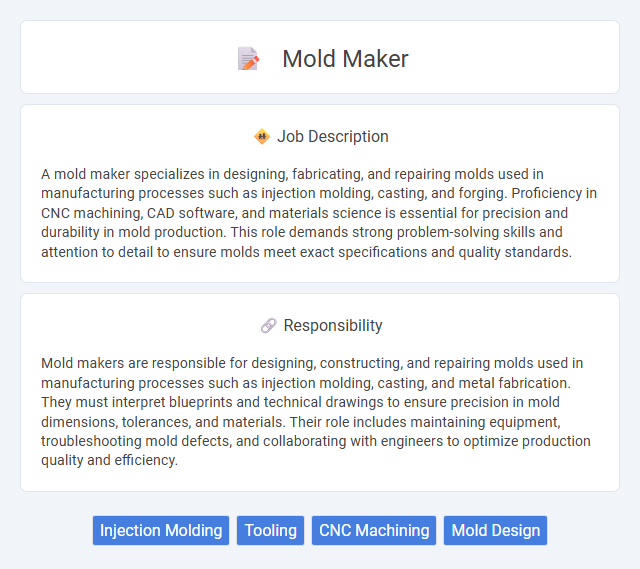
A mold maker specializes in designing, fabricating, and repairing molds used in manufacturing processes such as injection molding, casting, and forging. Proficiency in CNC machining, CAD software, and materials science is essential for precision and durability in mold production. This role demands strong problem-solving skills and attention to detail to ensure molds meet exact specifications and quality standards.
Individuals with strong mechanical skills and attention to detail are likely suitable for a mold maker job. Those who can handle precision work and tolerate standing for long periods may find this role fitting, while people sensitive to repetitive tasks or confined spaces might face challenges. Physical stamina and a steady hand are probably important factors influencing success in this occupation.
Qualification
A mold maker requires proficiency in precision machining, blueprint reading, and computer-aided design (CAD) software to create detailed molds for manufacturing processes. Strong technical skills in operating CNC machines, knowledge of metallurgy, and experience with quality control standards are essential for producing accurate and durable molds. Certifications such as NIMS (National Institute for Metalworking Skills) and hands-on apprenticeship training significantly enhance a candidate's qualifications.
Responsibility
Mold makers are responsible for designing, constructing, and repairing molds used in manufacturing processes such as injection molding, casting, and metal fabrication. They must interpret blueprints and technical drawings to ensure precision in mold dimensions, tolerances, and materials. Their role includes maintaining equipment, troubleshooting mold defects, and collaborating with engineers to optimize production quality and efficiency.
Benefit
A mold maker job probably offers competitive salaries due to the specialized skills required in designing and fabricating precision molds. Employees may experience benefits such as health insurance, retirement plans, and paid time off, which can enhance overall job satisfaction. Opportunities for skill advancement and overtime pay could also contribute to the attractiveness of this career path.
Challenge
Mold makers likely face complex challenges involving precision and attention to detail, as even minor errors can impact the quality of the final product. They probably encounter the difficulty of working with various materials and advanced machinery requiring technical expertise and constant skill adaptation. The role may also demand problem-solving under tight deadlines, making it a consistently demanding yet rewarding profession.
Career Advancement
Mold makers specializing in precision tooling often progress to senior roles such as mold design engineers or production supervisors by mastering CNC programming and advanced metalworking techniques. Gaining certifications in CAD/CAM software and lean manufacturing principles significantly enhances career advancement opportunities within industrial manufacturing sectors. Continuous skill development in materials science and automation technology positions mold makers for leadership roles in innovation and process optimization.
Key Terms
Injection Molding
Mold makers specializing in injection molding design and fabricate precise molds used to produce plastic parts for various industries, including automotive, aerospace, and consumer goods. They utilize advanced CNC machinery and CAD software to create molds that ensure high-quality, repeatable results and optimize cycle times in manufacturing processes. Expertise in material selection, mold maintenance, and troubleshooting is crucial to maintain productivity and reduce defects during injection molding operations.
Tooling
A mold maker specializes in creating precision tooling used for shaping and forming materials in manufacturing processes such as injection molding, die casting, and metal stamping. Expertise in CNC machining, CAD/CAM software, and metallurgy is critical for producing accurate molds that meet tight tolerances and ensure efficient production cycles. Mold makers collaborate with engineers to design and fabricate molds that optimize product quality and reduce material waste.
CNC Machining
A mold maker specializing in CNC machining uses computer numerical control technology to precisely shape metal and plastic molds for manufacturing industries. Proficiency in CAD/CAM software and in-depth knowledge of machine setup, tooling, and inspection processes ensure accurate mold production. Expertise in programming multi-axis CNC machines improves efficiency and consistency in producing complex mold components.
Mold Design
Mold makers specializing in mold design create detailed blueprints and 3D models for injection molds, die casts, and other tooling components, ensuring precision and efficiency in manufacturing processes. They utilize CAD software and advanced machining techniques to develop molds that meet strict tolerances and complex specifications for industries such as automotive, aerospace, and consumer goods. Expertise in material selection, thermal management, and mold flow analysis is critical for optimizing mold functionality and extending tool life.
 kuljobs.com
kuljobs.com